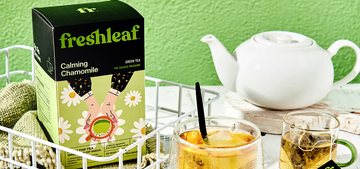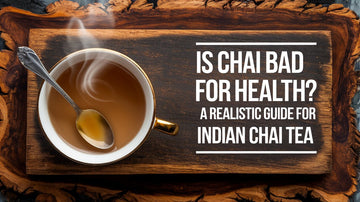Is Chai Bad for Health? A Realistic Guide for Indian Chai Tea
by Lovlesh Saini on Apr 26, 2025
There’s a scene that plays out in almost every Indian household: a whistling kettle, a hurried clinking of cups, and someone yelling from the kitchen, “Chai ban gayi!” It’s more than a beverage for us, it’s a ritual, a comfort, a conversation starter, and sometimes, the one thing that gets us through long days.
But every now and then, a little voice creeps in (or your well-meaning health freak friend) saying, “Yaar, itna chai mat piyo, health ke liye accha nahi hai.”
And you pause, mid-sip, wondering, “Is chai really bad for my health?”
Chai, also known as Indian milk tea, is a beverage that holds a special place in the hearts of millions of people worldwide. Its unique blend of black tea, aromatic spices, milk, and sweeteners creates a delightful and comforting experience for tea lovers. However, like any other food or drink, there is always a debate surrounding its impact on health.
So, let’s break it down. And no, we won’t bore you with complicated scientific terms or preachy advice.
First, What Exactly Is “Chai”?
In India, “chai” isn’t just tea leaves steeped in water; it’s a rich, creamy concoction of strong black tea, milk, sugar, and usually, a bunch of warming spices like ginger, cardamom, and cloves.
Each home has its own special recipe. Some like it kadak (strong), others prefer it halki (light). In winters, adrak wali chai (ginger tea) feels like a hug. In summer, a lighter elaichi chai hits differently.
When people talk about tea being “unhealthy,” they often mean masala chai or heavily sweetened, creamy versions, not just tea leaves in hot water.
Is chai unhealthy for you?
Now, it’s important to note that chai is not inherently bad for health. Many of the ingredients used in chai have potential health benefits. The black tea in chai is rich in antioxidants, which can help protect the body against damage caused by free radicals. Spices like cardamom, cinnamon, and ginger are known for their anti-inflammatory properties and can aid in digestion. Milk, a key component of chai, provides essential nutrients like calcium and vitamin D.
However, chai’s health benefits depend on how it is prepared and consumed. Traditional chai recipes often include added sweeteners like sugar or condensed milk, which can significantly increase their calorie content. Excessive consumption of sugary chai can contribute to weight gain and may increase the risk of developing diabetes and heart disease. It’s important to be mindful of the amount of sweeteners added to your chai and consider alternatives like honey or natural sweeteners to reduce the overall sugar content.
Another consideration is the caffeine content in chai. Black tea naturally contains caffeine, a stimulant that can increase alertness and boost energy. While moderate caffeine intake is generally safe for most people, excessive consumption may lead to side effects such as jitteriness, increased heart rate, and disrupted sleep. If you are sensitive to caffeine or have certain health conditions, limiting your intake of chai or opting for decaffeinated versions is advisable.
Additionally, personal tolerance and sensitivities play a role in determining the impact of chai on an individual’s health. Some people may experience digestive issues or discomfort due to the spices or milk in chai. If you have known allergies or intolerances to any ingredients, avoiding or modifying the recipe accordingly is best. ‘
The health benefits of chai tea
Now that you have a brief idea, let’s give chai the credit it deserves.
-
Tea leaves are rich in antioxidants: Specifically flavonoids, which are linked to better heart health, improved digestion, and even reduced inflammation.
-
Ginger and cardamom, common chai masala ingredients, are age-old ayurvedic champions. Ginger can help digestion and immunity, cardamom can freshen breath and support metabolism.
-
Milk adds a dose of calcium and protein, especially if you’re someone who struggles to get enough dairy otherwise.
So, in many ways, a well-made cup of chai can support your health.
Dr. Rekha Gupta, a Delhi-based nutritionist, puts it nicely:
“Chai, when consumed mindfully, can be a part of a balanced, happy life. It’s only when we overdo it or add too much sugar that it tips the scale.”
How harmful is tea for you?
Okay, now the part you might not love hearing.
-
Sugar Overload
Many of us (especially in North India!) are guilty of going heavy on sugar. That two-teaspoon habit, multiplied by four cups a day? That’s a lot of unnecessary sugar spiking your blood glucose levels, leading to weight gain, insulin resistance, and other health risks over time.
-
Too Much Caffeine
Chai has caffeine, though much less than coffee. Caffeine in moderation can boost alertness, but too much can lead to:
-
Sleep disturbances
-
Increased anxiety
-
Digestive issues (that acidity, you know it!)
Especially if you’re sensitive to caffeine, those 5-6 cups of chai can sneakily disrupt your body’s rhythm.
-
Milk Quality
Sadly, not all milk is created equal. Highly processed, full-fat milk or milk with additives can cause bloating, digestive discomfort, and add unnecessary calories.
-
Timing Matters
Having chai first thing in the morning on an empty stomach? Not ideal. It can stimulate acid production and lead to acidity or gas over time.
Similarly, gulping down chai right after meals can hinder iron absorption from your food, which is a big deal in India, where iron deficiency is common.
How to make your chai healthier?
Nobody is asking you to quit chai (God forbid!). Instead, here’s how you can chai smarter:
-
Go easy on the sugar: Try using jaggery or honey (though even then, moderation is key).
-
Choose better milk: If possible, switch to low-fat or plant-based options like almond or oat milk.
-
Balance your intake: One or two cups a day? Enjoy it fully. Six cups? Maybe slow down a little.
-
Avoid chai on an empty stomach: Have a banana, some almonds, or a small breakfast before your first cup.
-
Add real spices: Real adrak and real elaichi, not artificially flavored stuff!
Think of it as seasoning a good curry, natural, homemade touches always win.
Freshleaf’s little contribution to your chai
At Freshleaf, we believe that the joy of tea shouldn’t come with guilt or worry. That’s why we’ve created authentic, thoughtfully sourced tea blends that respect both your tastebuds and your health.
Our Cutting Masala Chai is packed with real ginger, cardamom, and fennel, all in a balanced blend using high-quality Assam black tea. No junky additives, no fake flavors. Just full-bodied, zesty chai goodness that lifts your energy without overloading your system.
Prefer something lighter? Our Cardamom Spiced Tea brings you the comfort of a classic elaichi chai, minus the heaviness. Perfect for that mid-day break between Zoom calls!
With Freshleaf, you don’t have to choose between pleasure and health. You get the best of both worlds, every single sip.
So, is Chai bad for your health?
In one word? No.
In five words? Only if you overdo it.
Chai becomes “bad” when:
-
You drink too much of it.
-
You load it with sugar.
-
You depend on it to function (hello, caffeine addiction).
-
You skip meals or ignore hydration because “chai kaafi hai.”
But when chai is enjoyed thoughtfully, with good ingredients, mindful portions, and at the right times, it’s not just not bad for you. It’s actually good for your mind, body, and soul.
It’s your 5-minute break. Your winter warmth. Your monsoon companion. Your post-lunch escape.
It’s home, in a cup.
And let’s be real, in a country as wonderfully chaotic as India, we deserve that kind of comfort.
Final Sip
Instead of treating chai as a villain or a health miracle, let’s give it the space it deserves: A lovely daily ritual, made a little healthier, a little smarter.
So next time someone tells you, “Chai acchi nahi hoti health ke liye,” just smile, take a mindful sip, and maybe offer them a cup of Freshleaf’s Cutting Masala Chai.
Trust us, they’ll thank you later.


